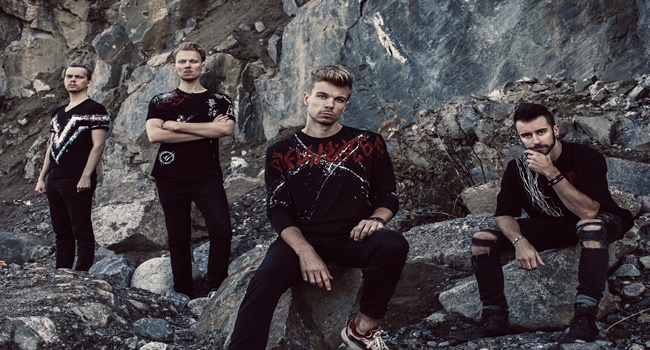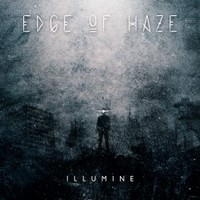Edge of Haze – Validation in Diversity
Tuesday, 15th November 2022
We tend to embrace a lot of Scandinavian metal at Dead Rhetoric – especially acts from Finland. Here’s another DIY band that we’ve been following on the site for quite a few years with Edge of Haze. Developing a sound that combines everything from doom and symphonic layers to 80’s synth pop beyond their progressive metal foundation, their latest album The Convoy of Ruin may be their most alluring, awe-inspiring outing to date. We were privileged to talk to drummer Janne Mieskonen, guitarist/vocalist Markus Hentunen, and bassist/vocalist Eero Maijala regarding their feelings about this latest record, their advanced outlook when it comes to the vocal/music development of these compositions, the climate change lyrical content and its importance, thoughts on the Finnish metal scene, plus individual thoughts on important records from Swallow the Sun, Katatonia, and Dream Theater among others.
Dead Rhetoric: The Convoy of Ruin is the latest Edge of Haze album. How would you assess the material in terms of development, the recording sessions, and where you see this record sitting in the landscape of what the band has offered to date?
Janne Mieskonen: I think it’s a big leap forward for us. We’ve gone forward in terms of the musicianship, writing, everything so much over the last few years. I reckon it’s like our magnum opus in a way, we’ve worked so hard for this record. We started it in 2018 the recording and writing for this album, so it’s been a long process.
Markus Hentunen: I agree with Janne, it’s almost a culmination of everything. The band has been together since we’ve been teenagers, and we’ve pretty much been learning everything by ourselves kind of within the process, going hand in hand. While we are developing as a band, we are learning new things – in a sense it feels that this album in question is the way we’ve become adults with the music. We’ve reached the point where we can take ourselves a bit more seriously now.
Eero Maijala: It was a huge growing experience, for sure. A maturation process.
Dead Rhetoric: What qualities do you believe are important to get across in each and every composition of the band? Playing in a progressive-oriented form of metal, is there a balance that needs to be achieved between intricacy/technical prowess while also serving the needs of the song at hand through memorable hooks, melodies, and harmonies not just on the musical front but also vocally?
Hentunen: What a great question. I feel that’s one of the bigger things that we are exploring together as a band. Definitely when you look at the progressive avenue of metal in general, it enables you to be a bit freer and more experimental with what you are doing. It’s not super closed off to specific factors. Especially for us, we come from a variety of different musical backgrounds, which means we enjoy a lot of different things about music. And see how different aspects of music can convey the story, and your emotions. It’s pretty incredible to be able to put all of those things together and then, just look at what the song wants to serve, what is the point to the song. And then use all the techniques you have in hand to see where it goes from there.
Maybe earlier it was a bit more about validating our technical capabilities. Trying to write cool riffs and maybe forgetting the purpose of developing the whole song. Here on this album, we really sought to find that balance. Have the hooky choruses and still the technical stuff there.
Dead Rhetoric: When it comes to the compositions, do you work with the music first and then the lyrics/vocals – because there are two dimensions to the vocals with Markus as the clean singer and Eero doing the growls, plus the female guest vocals?
Maijala: Usually, traditionally for us, the instrumentals come first. This kind of depends on who wrote the song as well. Markus is thinking more of the top lines, the other instruments. With this album, we moved more towards writing vocals at the same time, so that the proggy elements and the instrumental elements serve the vocals, and not the other way around. It depends on the song as well. There are a lot of tracks with some riff – like with “Floods” I can give you an example. Janne and I wrote it together, a couple of riffs, Janne came up with a vocal part – a co-write together.
Hentunen: It really depends on the situation. Normally the song ideas that we would have had in early years would be a sixteen-bar riff, and then you would try to write a song around that. Now, this record opened a lot more opportunities for us to explore. We would have cool chords on a piano, an idea for the vocals, and then try to write cool riffs around that. The arrangement stuff is unique to us, we have a unique sound. It is cool how many different ways you can take it and still have it sound coherent.
Dead Rhetoric: The lyrical content this time around tackles humanity’s journey towards destruction through violence, exploitation, and global warming. Can you elaborate on the subject matter, what ideas you wanted to get across, and where you see the importance of lyrics matching the atmosphere, textures, and feelings you get across through your material?
Mieskonen: I wrote most of the lyrics for the album, as I usually do. I like to create these stories, or soundtracks in a sense. It’s a very contemporary topic, at least where we live, we can already see the global warming and its effects on every aspect of life. It’s important to elaborate on those subjects with the music as well. I think it serves our doomy sound, dark sound we have, it’s very apocalyptic and feels really profound in the atmosphere.
Hentunen: Janne does the lyrics really well. There are many layers that need to match up. The theme of the song needs to match the overall soundscape of the song. But then, there are more details within that as well – the soundscapes and textures of the individual words and sentences. There are times on the record where we specifically looked into that. We’ve got the overall feeling, but now that we are starting with these really sparse vocals, we speak about the vastness of the deserted atmosphere, or scenery.
Maijala: A big factor in the first place of choosing this subject was the anxiety the future brings now. It came up naturally, we had a lot of conversations about global warming. In a sense, we want to get this out, share it with our listeners. Start a discussion on these topics because we think that it’s very important.
Mieskonen: I reckon the pandemic also contributed to this topic. It was a delicate time for the writing process, as the pandemic happened at the same time as I started writing the lyrics. Everything felt so apocalyptic around us, so that fed into the themes. It makes the whole experience more convincing when the subject is realistic and is something you can feel or experience yourself.
Hentunen: It’s pretty incredible, actually. We started this before the pandemic, and even then, we were talking about how topical it feels to be singing about these issues. The more years that have passed during the whole process, it’s become even more topical. We are not only singing about climate change, it’s even more general about people losing touch with humanity, or the aspect of being human, losing their senses. There are quite a lot of examples within the current state of the world. Just to sum it up, it’s a privilege to be able to put your thoughts into the form of music. It speaks to you in a deeper way. Many people don’t have the words to describe their inner thoughts, the anxiousness that they feel. It’s pretty cool to be able to be that vessel and allow for those people to have the words to describe their feelings and to get them out.
Dead Rhetoric: How would you describe Edge of Haze when it comes to your live performances versus what the listeners take in on record? What do you try to get across to audiences, and what have been some of your most memorable or favorite live performances to date?
Mieskonen: You would imagine that when you are listening to Edge of Haze you would think that we were only a studio band. Well-drafted songs, grandiose, but actually we’ve been really active lately on the live front. We’ve played some of our favorite shows this year – we played at the Euroblast festival in Germany this year, just a month ago. It was probably the best gig of all time for us. It was a full house; everyone was really into our stuff. It’s a progressive metal festival, so it was a proper audience for it.
Maijala: It was a dream come true. A full circle moment, as we were there at Euroblast in 2014 just as fans, listening and enjoying the festival. Now we got to play there. We are a little bit like perfectionists, to get things as good as possible. We want everyone to have a good time, even though there are gloomy sides, hopelessness also in the songs. When we play live, we want people to forget about the outside world for the performance time and have a great time, drink a beer and sing with us. That’s our goal.
Hentunen: To compare the studio version to the live versions – the studio versions have a wide spectrum between the soft and hard parts, kind of the range of emotions. We try to convey that live as well – not only building the set to convey a story, but then really emphasize the soft parts and the hard parts. We love playing live, it enables you to feel those feelings in a bigger form. We tend to be quiet, and the lights dim when we go soft, and then we go as crazy as we can when we are harder in all the physicality we have. It supports the idea you may have in your head about the larger perspective conveyed from the music only itself.
Dead Rhetoric: So far, the band continues to release material independently – discuss the pluses and minuses regarding this career path for Edge of Haze? Would you like to have stronger label representation – and if so, what qualities / relationship would you hope to develop that could be beneficial in Edge of Haze garnering a stronger, global following?
Hentunen: It’s a cool situation these days how much technology enables you to do things yourself. We are perfectionists, we like to tweak every detail and we are comfortable with that, but not everybody else is. We like to spend long days in the studio on our computers, that is how we produce the stuff. When you are independent, you can do all those choices and effect the things that you really want. At the same time, it’s hard to have to do all the other aspects as well. We’ve gotten some incredible management support over the last couple of years, a booking agency as well. We’ve realized how much it brings freedom to have those professionals working with you as well. When someone else is leveraging their networks on those important areas, those kinds of relationships allow you to concentrate on the creative part even more or the stuff you are really good at personally yourself. It goes for all the relationships we want to build. We want those relationships to open up new doors and at the same time strengthen our own core capabilities.
Mieskonen: It’s definitely hard to reach all of the potential audience out there when you are doing everything independently, releasing albums. It brings a lot of freedom, and we don’t have to limit our creativity in any sense. We are open to work with a potential label, and we’ve had some talks. We will see what the future brings for us.
Hentunen: I have to add, a lot of the times people have a pretty old-fashioned picture on what it means to work with a record label. There are those limiting aspects we discussed, but we realize it’s not only about that. The best kind of a relationship with a label themselves are the people who actually get what your thing is and enable you to concentrate on the capabilities bringing new stuff to the table. There are people who don’t want to limit the band and make them want to pursue their dreams even more.
Dead Rhetoric: What are your thoughts on the music scene within your part of Finland – as well as the general love/acceptance for heavy metal and its various styles across your country?
Maijala: The scene is doing very well. There are a lot of really exciting new bands coming from Finland. Of course, it’s the land of heavy metal as well – most metal bands per capita. The cool thing is we have been playing around Finland for a few years now, we’ve been playing gigs with a lot of bands from the scene and making a lot of good friends. For example, we are good friends with Arion. It’s great to see peers inspire us as well, it’s great that we have a community here as well.
Mieskonen: We had the busiest festival summer in Finland of all time this year. A lot of festivals, a lot of gigs. We were touring with Swallow the Sun earlier this year, those kinds of bands do regular tours in Finland. There are a lot of opportunities that arise here.
Maijala: We had almost too many festivals last summer, there were a lot of cancellations as well.
Hentunen: The state of the scene after the pandemic has been pretty overwhelming.
Dead Rhetoric: What worries or concerns do you have regarding the world that we are living in today? Where do you think the leaders of the world need to put more time, energy, money, and focus upon to make things better for the greater good of the average person in the world?
Mieskonen: That’s a pretty big question, and I reckon it has more to do with the amount of greed that exists that should be regulated. We need to have more rotation for the people that are in power so that people don’t concentrate the power for themselves and create dictatorships and such.
Maijala: For me, the subject of the album, climate change is a big one. It’s also stupid that it’s faded into the back, versus the urgent stuff like the war in the Ukraine. It’s sad to see that the internet is dividing us into different camps that don’t know how to communicate better. At least that’s how it seems online. If you go to the rural part of Finland, then you realize you have more in common with other people even if they like a different political party. I don’t know if it’s ever going to be solved.
Hentunen: Even though social media plays such a huge role these days, it’s not the whole reality. Go outside and speak with real people, you will notice that we are more alike than you’d really think. All in all, we are still in an early phase of communicating on the internet, we really don’t know where we are at and how to use it. We have been overwhelmed with connecting with each other, we are actually starting to distance from each other at the same time. The situation is becoming more polarized. I wish we could concentrate more on seeing eye to eye instead of being the loudest voice.
Dead Rhetoric: What would you consider three of the most important albums that helped shape your outlook on the metal genre as a whole?
Maijala: I might have to go with Swallow the Sun – New Moon. It’s a huge one for me, and probably for Janne as well.
Mieskonen: For me it’s probably Katatonia – The Great Cold Distance. Because I really didn’t understand that you could have clean vocals with metal, and that was a revelation. I used to listen to stuff like Lamb of God and Metallica, and Katatonia is so different.
Hentunen: I will go a different route then. One album I have a strong love/hate relationship with is Dream Theater – Metropolis II: Scenes from a Memory. It’s an album I keep coming back to, and each time I have a different outlook on what I think about it. It used to be the holy grail for me when I was thirteen. It introduced to me to prog in general, or conform to any rules in music. It’s cool compositionally. Years later, I hated it, I thought it was cliché, wanting to chill out for a minute. I started to explore the balance of emotions and what I want to convey with music. I see the album now as playing an important part in my exploration and I see the middle ground.
Dead Rhetoric: What’s next on the agenda for Edge of Haze over the next twelve months to support this release? Do the member(s) also have any other side projects, outside bands, or special guest appearances of note that we can look forward to?
Mieskonen: We are planning to play some gigs. Starting to write new stuff, already. We can actually release the next album much quicker than this one. I hope you stay tuned.
Hentunen: There’s a lot that we can’t talk about yet, but if everything goes according to plan, we will be able to share some of that news sooner than you might think.

























